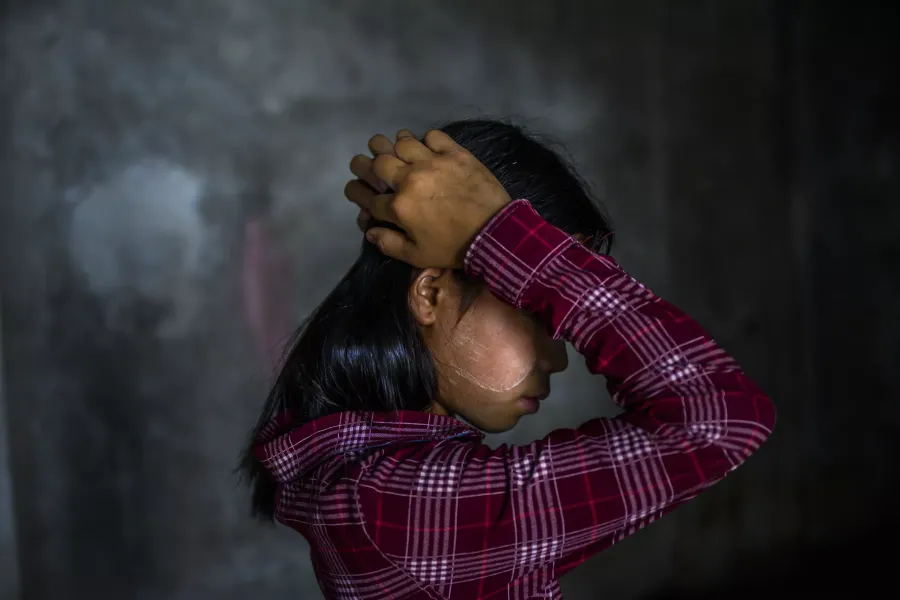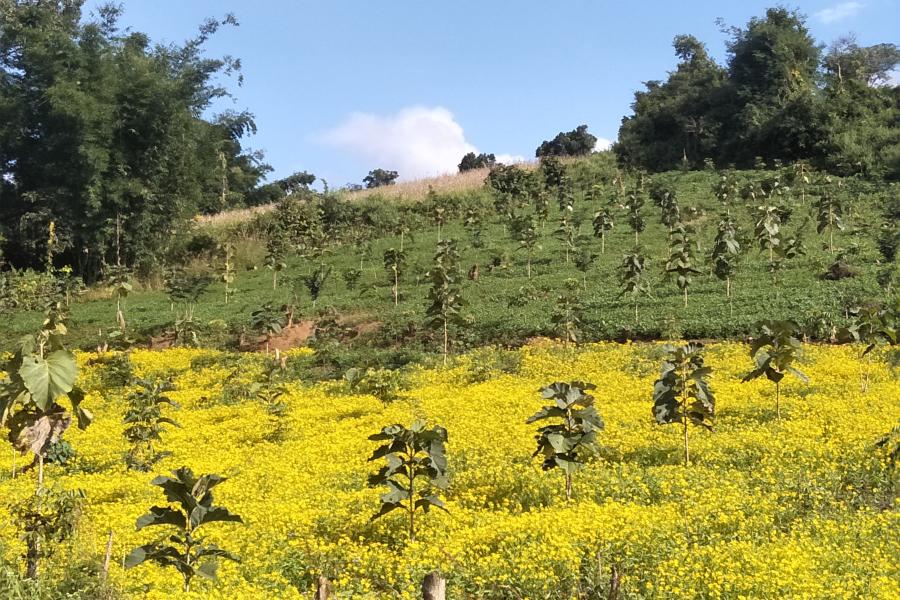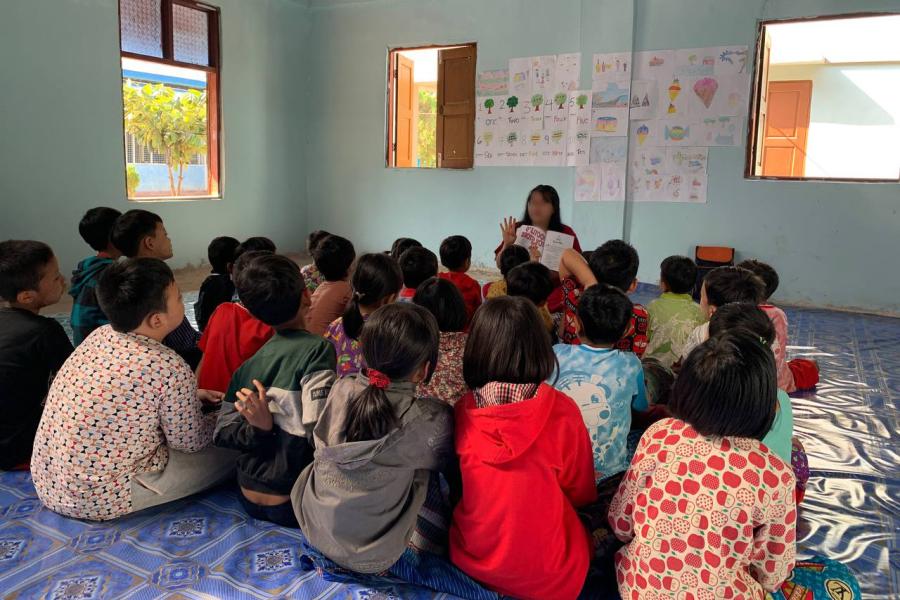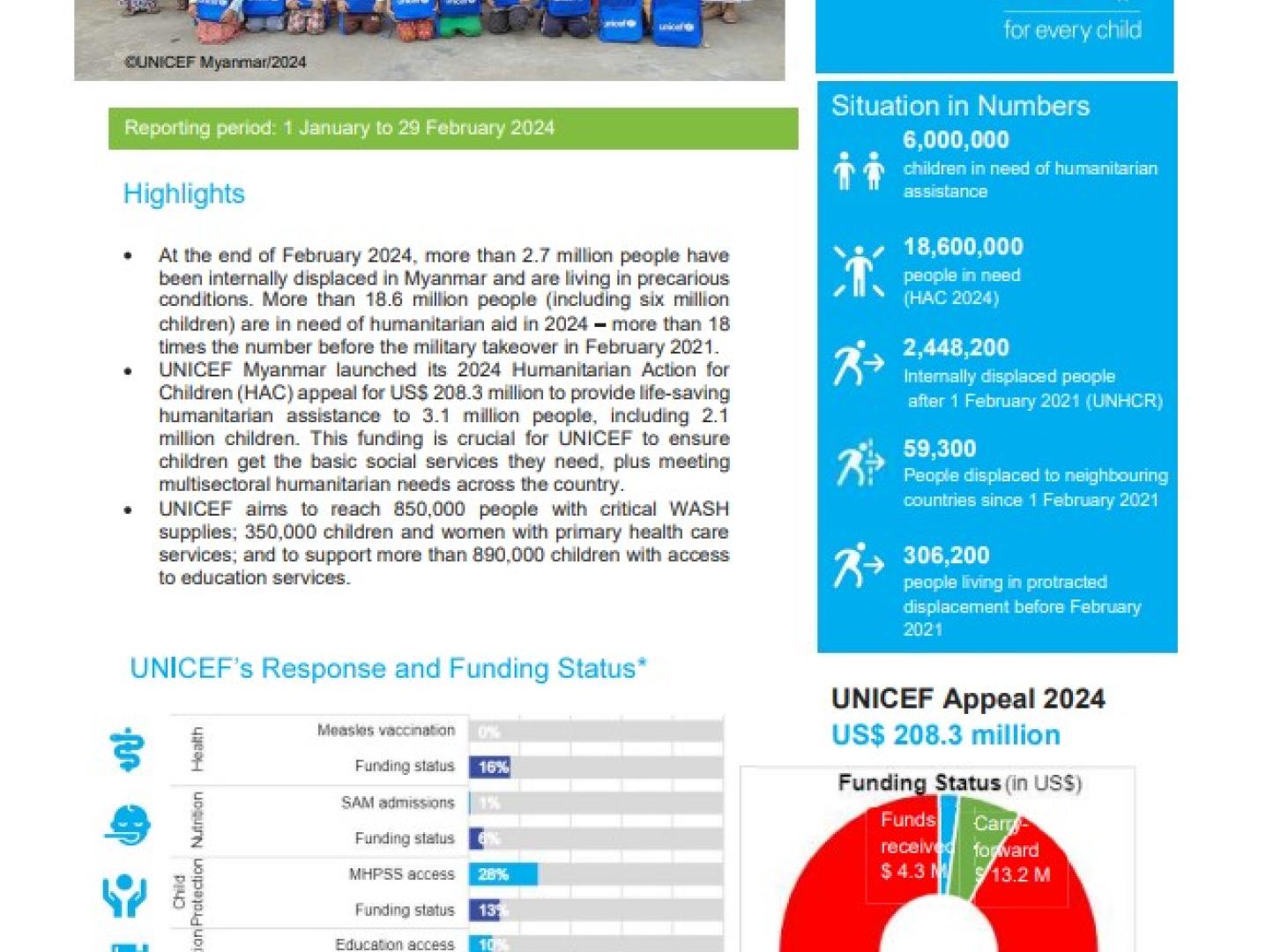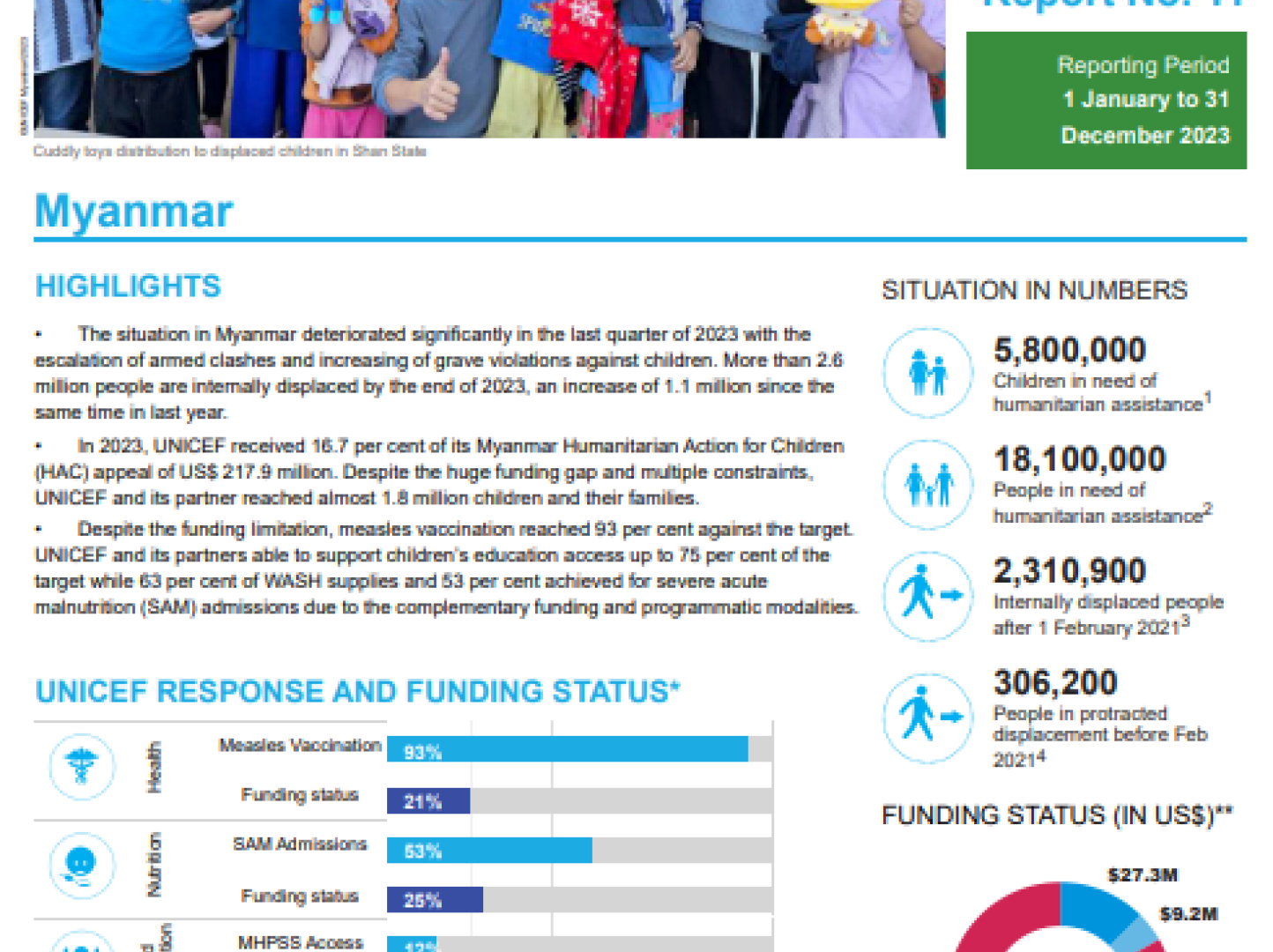Latest
The Sustainable Development Goals in Myanmar
The Sustainable Development Goals are a global call to action to end poverty, protect the earth’s environment and climate, and ensure that people everywhere can enjoy peace and prosperity. These are the goals the UN is working on in Myanmar:
Video
24 April 2024
Secretary-General’s Video Message to the 2024 ASEAN Future Forum
Excellencies, ladies and gentlemen, For nearly six decades, the countries of South-East Asia have built a dynamic, resilient and diverse regional economy. And you’re a strong voice for peace, dialogue, disarmament and non-proliferation on the global stage. But this Forum’s call for “fast and sustainable growth” reminds us of the work ahead. The impacts of global conflicts, climate catastrophe, and lingering poverty and inequality are keenly felt in South-East Asia. The Sustainable Development Goals — and the hopes and dreams of people around the world — hang in the balance. Now is the time to accelerate and scale-up investments in the SDGs. Now is the time to tackle the climate crisis, and anchor economies in renewable energy and green solutions. And now is the time to reform and rebalance critical global systems and institutions — from the United Nations Security Council, to the global financial architecture. This September’s Summit of the Future will be a moment for the world to come together and share solutions to shape a better, more peaceful and prosperous future. The ASEAN family of nations is critical to this future, and I look forward to carrying our partnership to new heights in the years ahead. Thank you.
1 of 5
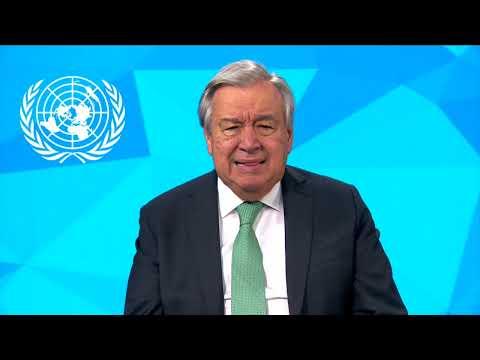
Video
22 March 2024
International Day of Forests 2024: Forests and Innovation - New Solutions for a Better World
Innovation is unlocking the forests’ long-kept secrets and allowing us to use trees in ways we never imagined possible. Materials derived from forests and trees are being developed as sustainable substitutes for plastics, building materials, fabrics, medicines and many other everyday items. At the same time, rapidly evolving drone and satellite technology is helping us to monitor and manage our forests, detect and fight fires and safeguard ecosystems.Innovation can help us restore, protect, manage and use our forests sustainably. Footage courtesy of Dassiet, Ilmari Häkkinen & Finnish Osprey Foundation, Metsähallitus, Repolar, Sofia Ilmonen, Spinnova, Storaenso, UPM, VTT & National Land Survey of Finland
1 of 5
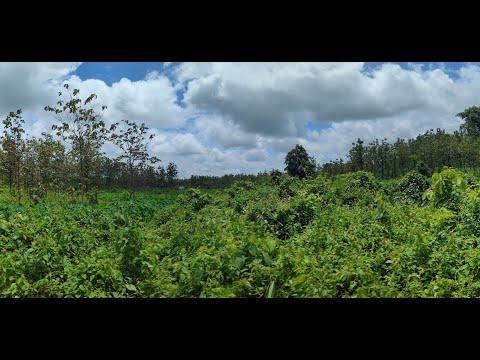
Video
08 March 2024
Secretary-General’s Video Message for the International Women's Day
On International Women’s Day, we celebrate women and girls around the world, and we applaud all they have achieved in the fight for equality. Women and girls have made great gains – demolishing barriers, dismantling stereotypes and driving progress towards a more just and equal world. Yet they face immense obstacles. Billions of women and girls face marginalization, injustice and discrimination, while the persistent epidemic of violence against women disgraces humanity. Our world still reflects millennia of male-dominated power relations. And progress is under attack, with a fierce backlash against women’s rights. At our current rate, legal equality is some three hundred years away. We must move much faster. On International Women’s Day, we stand with women and girls fighting for their rights, and we commit to accelerating progress. This year’s theme – invest in women – reminds us that ending the patriarchy requires money on the table. We must support women’s organisations on the front line. And we must invest in programmes to end violence against women, and to drive women’s inclusion and leadership in economies, digital technologies, peacebuilding and climate action. This all depends on unlocking finance for sustainable development so that countries have funds available to invest in women and girls. We also need to increase the number of women leaders in business, finance, central banks and finance ministries. This can help drive investments in policies and programmes that respond to women and girls’ needs.Women’s rights are a proven path to fair, peaceful, prosperous societies. It is good for us all. Together, let’s take urgent action to make it a reality. Thank you.
1 of 5
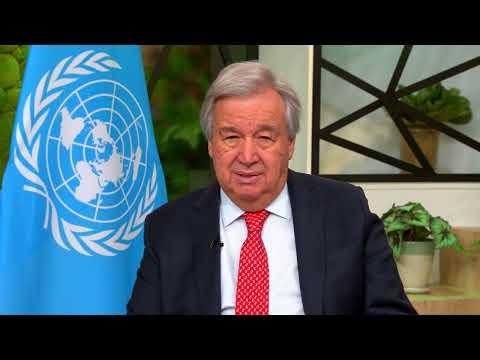
Press Release
08 February 2024
Statement on the deaths of children in air attacks on schools in eastern Myanmar
“UNICEF is appalled by the deaths of four school children and two teachers as the result of an air strike on two schools in Kayah state, eastern Myanmar, on Monday.
“The children who died were aged between 12 and 14. Many more were injured. More than 100 children were in school at the time of the strikes.
“UNICEF strongly condemns any strikes against schools and places of learning, which must always be safe spaces for children.
“Attacks against schools are a grave violation of children’s rights and can constitute a violation of international humanitarian law.”
#####
1 of 5
Press Release
01 February 2024
ILO marks third anniversary of Myanmar military takeover with call for the release of trade union leaders and all those unjustly detained
GENEVA (ILO News) – On the third anniversary of the military takeover in Myanmar, the International Labour Organization (ILO) Director-General Gilbert F. Houngbo has repeated his call for the immediate release of all those detained for exercising their civil liberties and carrying out legitimate trade union activities.
"The future well-being of Myanmar depends on a peaceful transition to full democratic rule, which begins with the release of all those who are unjustly imprisoned. There can be no future for the people of Myanmar if it is not firmly anchored in the social justice they so richly deserve," he said.
The Director-General highlighted the case of Thet Hnin Aung, General Secretary of Myanmar Industry Crafts & Services Trade Unions Federation (MICS-TUsF) who according to reports was sentenced to seven years imprisonment in late 2023 following the completion of an earlier sentence.
“The sentencing of Thet Hnin Aung is a case for deep concern. The continual erosion of civic space and trade union rights in Myanmar, as highlighted in ILO’s recent Commission of Inquiry report, are unacceptable. Thet Hnin Aung and all those detained for carrying out legitimate trade union activities will not be forgotten,” Houngbo added.
The case of Thet Hnin Aung was specifically addressed in the report of the ILO Commission of Inquiry (CoI) on Myanmar. The CoI was established by the ILO Governing Body in March 2022 tasked with assessing reports of violence against trade union leaders, severe and repeated violations of basic civil liberties and a resurgence of forced labour.
The incarceration of Thet Hnin Aung, along with ongoing actions that both undermine the civil liberties of trade union leaders and members, and undercut the labour movement, will inform the follow up to the CoI report at the March 2024 session of the ILO Governing Body.
"The future well-being of Myanmar depends on a peaceful transition to full democratic rule, which begins with the release of all those who are unjustly imprisoned. There can be no future for the people of Myanmar if it is not firmly anchored in the social justice they so richly deserve," he said.
The Director-General highlighted the case of Thet Hnin Aung, General Secretary of Myanmar Industry Crafts & Services Trade Unions Federation (MICS-TUsF) who according to reports was sentenced to seven years imprisonment in late 2023 following the completion of an earlier sentence.
“The sentencing of Thet Hnin Aung is a case for deep concern. The continual erosion of civic space and trade union rights in Myanmar, as highlighted in ILO’s recent Commission of Inquiry report, are unacceptable. Thet Hnin Aung and all those detained for carrying out legitimate trade union activities will not be forgotten,” Houngbo added.
The case of Thet Hnin Aung was specifically addressed in the report of the ILO Commission of Inquiry (CoI) on Myanmar. The CoI was established by the ILO Governing Body in March 2022 tasked with assessing reports of violence against trade union leaders, severe and repeated violations of basic civil liberties and a resurgence of forced labour.
The incarceration of Thet Hnin Aung, along with ongoing actions that both undermine the civil liberties of trade union leaders and members, and undercut the labour movement, will inform the follow up to the CoI report at the March 2024 session of the ILO Governing Body.
1 of 5
Story
05 April 2024
Dreams at risk
"In a split second, my world shattered into a million pieces along with that landmine. My brother, my dreams, everything," Naw Nee's voice quivers with emotion as she recounts the tragic day when her brother fell victim to a landmine explosion. At just 13 years old, she grapples with the overwhelming weight of grief, the persistent agony of shrapnel embedded in her body, and fading hopes of becoming a physician.Now in its third year, the escalating conflict in Myanmar is taking a devastating toll on children who are bearing the heaviest burden and brunt of violence, mass displacement and severe disruptions to critical services, including health and education.But as the clashes intensify, the increasing use of deadly weapons, especially landmines by all parties to the conflict, is bringing the grim reality of killing and maiming—the worst form of grave violations against children—to the doorsteps of many families across Myanmar.“We had already gotten used to the constant sounds of shooting, and we knew we had to run into our homes to escape crossfire; but landmine explosions right in our neighborhoods make us feel there is just no safe place,” said 14-year-old Paing, whose childhood dream was to be a soldier, spurred by the passion to protect his family and community from raging conflict.But like Naw Nee, Paing is struggling to see any future after he stepped on a landmine in his community farm, triggering an explosion that shattered his right leg and damaged his hand. “I went with my father to search for our injured cow in a nearby farm when I suddenly heard a loud bang, and my body flew above the ground. I thought it was a mortar dropping nearby, but actually I had stepped on a landmine,” Paing recalled.His right leg had to be amputated to save his life. “Now I only dream of being able to somehow support my parents, and also my family when I have mine someday. The dream of being a soldier is forever gone.”Like Paing, Naw Nee no longer sees her home community as a place of refuge after losing her only brother to a landmine explosion in December 2023. “I was playing with my friends and my younger brother after school, just outside our home, when I saw my younger brother picking up a round object the size of a marble with a nail-like attachment,” she recalled. “It didn't last more than a couple of blinks before it blew up, killing my little brother and also injuring my friend and me, with pieces of shrapnel piercing into my cheek, head, and back.”Naw Nee was rushed to the nearest hospital where some of the pieces of shrapnel were removed, but at least two pieces remain lodged in her body. Even though she is lucky to have survived, things will never be the same again. “Our playground now only reminds me of the death of my brother and doesn’t provide me with any good memories anymore.”UNICEF’s Landmine Incident Monitoring Report revealed a total of 1,052 verified civilian casualties from landmine explosions in 2023, which is 270 per cent of the 390 recorded in 2022. Alarmingly, nearly half of the 1,052 civilian casualties from landmines in 2023 were recorded between October and December alone, indicating a significant spike in the use of deadly weapons as conflict exacerbates. With almost all states and regions of the country now reported to be contaminated by landmines, it is a particularly dire situation for Myanmar’s children, who account for over 20 percent of landmine casualties. Every step they take could be their last.In the Bago region, which ranks third highest in casualties from landmine incidents at 9 percent, after Sagaing region (35 percent) and Shan state (12 percent), livelihoods and survival are both at risk, with farmlands also heavily contaminated.Losing his mother at birth and with his father having fled the country years ago, 15-year-old Aung looks up to his older brother, with whom he works on a family farm to make a living and support his education. However, the afternoon of 20 December 2023 upended his life forever.“I was working on our family’s rice farm after school when I stepped on a landmine. I heard a loud bang that deafened my ears, and I passed out for a moment.”Regaining consciousness in the hospital, Aung recalls seeing doctors and nurses operating on him. “I lost my left leg below the knee, and my left hand was injured.”Facing the future feels daunting for Aung. “My dreams of overcoming our family's hardships are now at risk, without my leg to propel me forward,” he said. As Paing’s mother, Daw Eint, said, “Every time our children step out of our homes, whether it's to school, the farm, or to play, fear grips our hearts like a vice. We never know if they will return safely, and the looming threat of landmines only adds to our anguish.”In 2023, UNICEF reached nearly 140,000 people, including children, across Myanmar with mine risk prevention and response service including survivor assistance. Mine risk education sessions, backed with pamphlets and handbooks adapted in local languages, are being scaled up across conflict areas.The increasing use of landmines in Myanmar presents an alarming threat to the safety and well-being of children. Every explosion not only claims lives but also shatters dreams and robs children of their childhood innocence. It is imperative that all stakeholders, including all parties to the conflict, work to ensure the safety and protection of children from the devastating impact of landmines.*This story was originally published on UNICEF Myanmar Website on 4 April 2024.
1 of 5
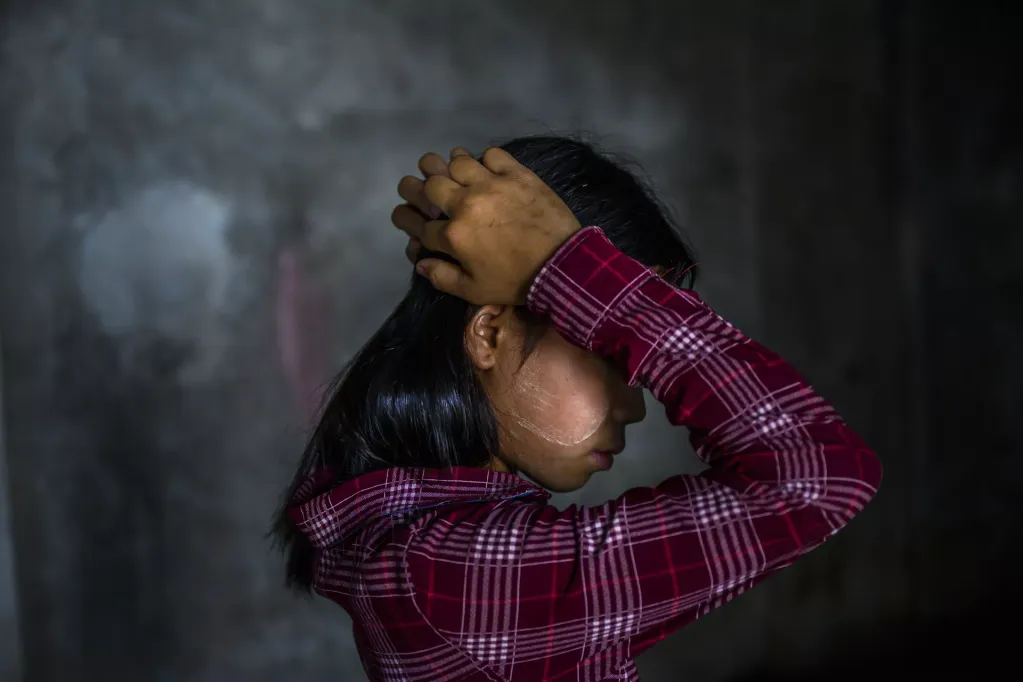
Story
19 March 2024
Reclaiming the Green: A Story of Local Communities in Myanmar's Shan State Taking a Stand Against Deforestation
Myanmar's Shan State had long been celebrated for its breathtaking landscapes, rich cultural heritage, and vibrant communities. For generations, the local villagers thrived amidst dense forests, lush farmlands, and a strong sense of tradition. However, a looming threat now casts a shadow over this idyllic setting: deforestation driven by the resurgence of opium cultivation.In recent years, a disheartening reversal has unfolded the positive trend of reduced opium cultivation in Shan State. Following a 95% decline in the opium production in Afghanistan, Myanmar has now claimed the unwelcome title of the world’s leading opium producing country, reaching a staggering 1,080 metric tons in 2023. This shift has had a profound impact on the region's ecosystem and the local Shan communities, with deforestation emerging as a grave consequence.“Deforestation has had terrible impact on our villages and the communities, and we are facing this in our daily lives. Deforestation is depleting biodiversity of our forest which jeopardizes the unique plants and animals that make our forests so special. Our water resources become depleted, clean water becomes scarce, and our fertile ground suffers from soil erosion. To add onto this, there is also a risk of landslides and flooding during the monsoon season. This is the reality that we are facing daily,” says Khun Ta Be, leader of Htan Hpa Yar Community Forest in Hopong Area, Shan State. Recognizing the urgency of the situation, the United Nations Office on Drugs and Crime (UNODC) has stepped in to addresses the issue of deforestation related to opium poppy cultivation. Community forest user groups have been formed to unite villages in their commitment to protect their natural resources. These groups unite the villagers in their shared commitment to establish clear boundaries and ensure that forest areas remain untouched. Guided by UNODC, the community develops and implements a sustainable forest management plan."In 2020, as part of the forestry and climate change training, UNODC supported us with the efficient stove production technique. All households in the village have been using these techniques to make efficient stoves. We learned from the training that using these efficient stoves can not only decrease deforestation but also mitigate climate change. It is also beneficial to our health because it produce less smoke. Thanks to this initiative, we have witnessed a remarkable reduction in fuelwood consumption in our village," notes a local ethnic person. The positive effects of these initiatives extend beyond the protection of water sources and the conservation of natural forests. Agroforestry becomes a way of life as the villagers discover the benefits of growing crops and fruits such as coffee, tea, and avocados alongside their traditional practices. This not only provides a legitimate income but also acts as a shield against soil erosion in their agricultural lands. Local communities organizing forest activities, imparting techniques, and sharing knowledge related to climate change and sustainable development have been transformative. With determination, the village had become a beacon of hope, showcasing the power of collective action in restoring and preserving the balance between humanity and nature. The village had been given a lifeline, and the intangible heritage of their newfound practices were now cherished, ready to be handed down to future generations. By the end of December 2023 (2017 to 2023), UNODC’s Alternative Development Programme restored 1,407 hectares with valuable species and 1191 hectares of area have been supported with agroforestry system. Every year, over 3000 seedlings are planted in school compounds together with students and teachers as part of UNODC’s broader environmental education initiative. The story of Myanmar's Shan State serves as a testament to the power and resilience of community action in the face of environmental challenges. It reminds us all of the importance of collective responsibility and the potential for positive change when communities unite for a common cause. Let the tale of Myanmar's Shan State inspire us to take action and protect the invaluable heritages we have, ensuring a brighter and more sustainable future for generations to come.
1 of 5
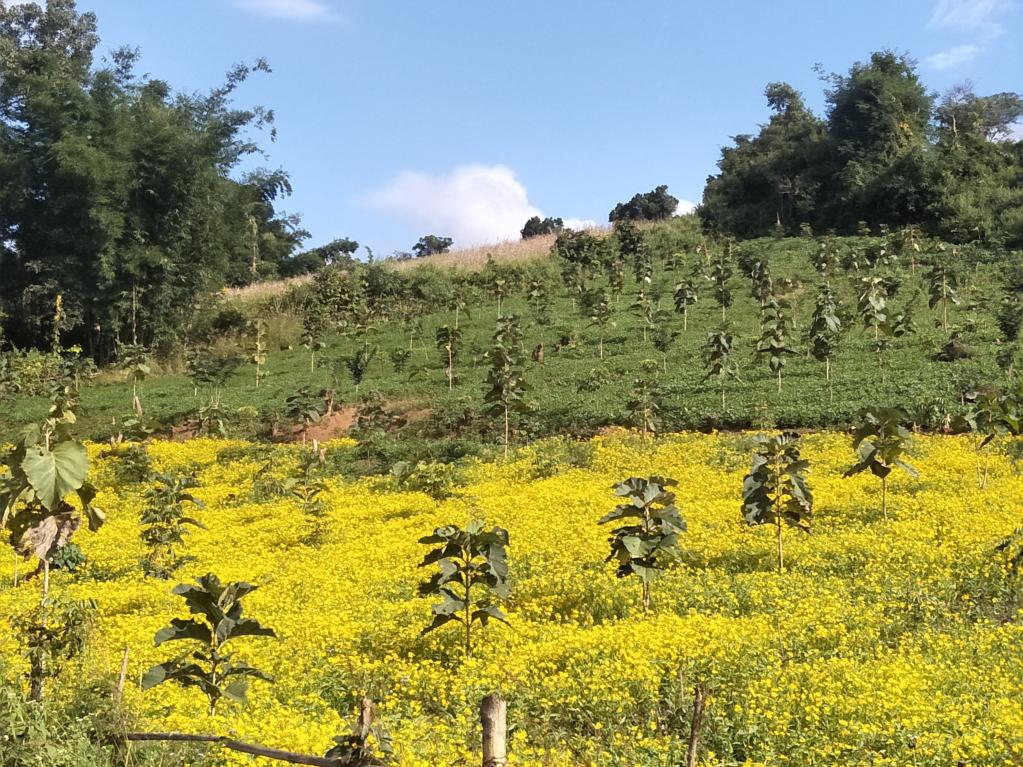
Story
20 March 2024
Resilience amid adversity
Nant May Barani, a 31-year-old teacher is at the forefront of restoring and expanding education access for children in the Ayeyarwady region, central Myanmar. Like many parts of Myanmar, Ayeyarwady region has also been severely affected by prolonged school closures due to the COVID-19 pandemic, exacerbated by conflict since early 2021. These combined challenges have taken a heavy toll on education, depriving children of learning opportunities for an extended period. This has resulted in a widespread decline in interest in education, leaving children vulnerable to various protection risks that could jeopardize their future wellbeing and productivity.“It was a very rapid and scary decline in learning opportunities for our children, and the looming disaster was staring us in the face with children roaming the streets and facing multiple risks,” said Nant May, who has dedicated 5 years as a volunteer Karen Literature Instructor in a public school. She has also spent 4 years as a full-time assistant teacher in another community school in Ayeyarwady Region. In addition to government education, she was also one of the leading teachers in the local church’s Karen literature course. "As a lifelong teacher, it was a daily torment for me, witnessing the dreams of these children slowly fading away, and I felt compelled to take action to salvage the situation," Nant May emphasized, underscoring her drive to actively pursue opportunities to volunteer and restore educational services for children.Nant May's aspiration to reach the largest number of out-of-school children found a crucial avenue when the Quality Basic Education Pathway for Children (QBEP4C) project was expanded to townships in Ayeyarwady region in May 2023. Supported by funding from the EU, Finland, and Australia, QBEP4C is a community-driven UNICEF initiative crafted to bridge the education gaps stemming from the COVID-19 pandemic and ongoing conflict. It offers alternative and supplementary pathways for children and adolescents to catch up on missed educational opportunities and reignite their dreams.Reconnecting children to education services in the community came with its challenges, as Nant May recalls: “When the children got back to learning programs, after such a long break, their interest in studying was just not there. The fact that they all had phones now just made things worse”.At the start of the program, teachers had to contend with multiple challenges such as children showing up with their phones and some not socializing with other learners. Recognizing the need for a fresh approach, Nant May explored beyond conventional teaching methods not only to grab their attention but also to encourage good behavior. “I’ve slowly been trying to show the children the joy of reading. We would play games together, and I can see the kids getting better at teamwork. Give them paper and some colors, they’re all excited to draw and make crafts. They’ve even gotten the hang of keeping things tidy, putting books where they belong.”Sa Khant Wai Aung, an eight-year-old boy who had to take a break from school halfway through the kindergarten school year because of his health condition, is also part of the program. Despite having to get blood transfusion for his high white blood cell count every now and then, he recounts his learning experience, “I really, really like coming to the library! Playing with my friends is awesome, and I love reading books. Drawing is super fun and playing with playdough is also so much fun! Teacher Nant May tells us great stories and I love her!”Parents also respond positively to the program's impact on the children's change of behavior beyond the learning center - from relying on smartphones to discovering a newfound joy in other activities.“Before, when they came home, all the kids wanted was to use their phones. Now, they enjoy reading books, drawing, and participating in other activities, all while cutting down on their screen time,” said Daw Aye Myint, a mother of three whose two daughters are attending the program.Nant May Barani also found herself equipped with newfound skills from a 10-day training program on “Digital Literacy, Literacy and Numeracy Assessment, Multiplier and Teacher Resource Package", provided by the QBEP4C project. She now seamlessly incorporates digital literacy into her teaching methods.“I’ve now started using Learning Passport for telling stories. Also, I’m not a good drawer, but now that I can find my way around YouTube, I would search for the basic drawing videos, practice on my own first before teaching my kids. Same goes for crafting and photography, I picked up some photography tips for capturing the children in action from both YouTube and Google. Viber is also quite useful for me. Generally, I’ve learned a lot more about child rights – whenever I need to discipline a child, I’d use stories from the book instead of just saying ‘don’t do that.’ It keeps things light, and you know, doesn’t hurt their feelings.” On behalf of the community, Nant May Barani expresses gratitude for the impact of the QBEP 4C: “I’m truly grateful for this program. I also believe the strong interest and active participation from parents and the community have truly made this program a success. Our learning center is now filled with books, generously supported by the project and the community’s contributions.”Nant reflects on how the QBEP4C program is empowering dedicated teachers like herself to fulfill their vision of re-establishing connections with learning opportunities for children: “I simply want the children in our community to genuinely delight in books, cultivate positive habits through reading, and ensure their needs are met, all to support them in achieving their aspirations for a brighter future”. Ongoing conflict in Myanmar has resulted in a lack of educational opportunities for over 4 million children. With generous funding from donors, the QBEP4C is addressing this gap by offering continuity in learning activities and establishing alternative education pathways to vulnerable and conflict-affected children and adolescents across Ayeyarwady, Bago, Chin, Kachin, Magway, Rakhine, Sagaing, Mandalay and Shan areas.
1 of 5
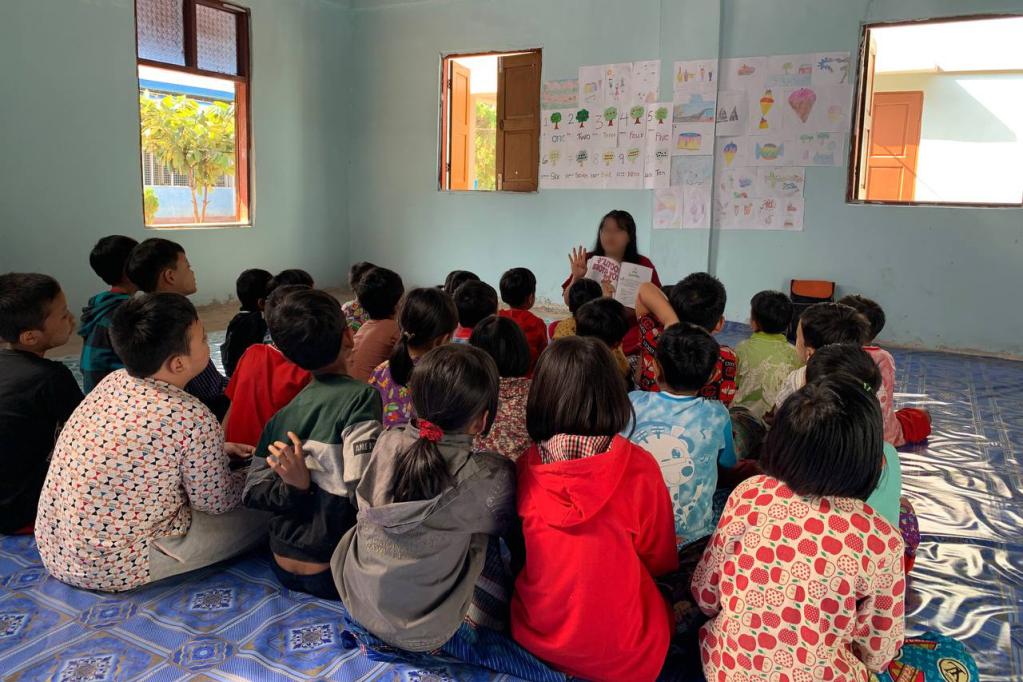
Story
07 March 2024
Growing sustainable women-led businesses in Myanmar
Thiri Aung, aged 43, is a Yangon-based entrepreneur originally from the small town, Pyin Oo Lwin, in Myanmar’s Mandalay Region. In this interview, Thiri tells us how she’s helping Myanmar’s women business owners succeed in the face of ongoing crises.Three years after the military takeover in Myanmar on 1 February 2021, the country’s economy has shrunk by around 10 per cent, making Myanmar the only country in East Asia that has not returned to pre-pandemic levels of economic activity.[1] And as fighting continues to intensify and the economic, political, and humanitarian crises worsen, families are in financial distress and coping capacities are stretched to the limit. Women are particularly vulnerable and the situation has led to a notable backslide in progress on gender equality and women's empowerment. Traditional norms about what women can and should do obstruct their access to certain professions and industries, and to positions of leadership, so they are often relegated to lower-paid forms of employment. They were also overrepresented in the employment sectors hardest hit during the COVID-19 pandemic,[2] with the female unemployment rate increasing five-fold from 2 per cent in 2017 to 10 per cent in 2022.[3]Within this environment, Thiri Aung – a Myanmar woman entrepreneur and founder of the women’s business support network, Women Transforming Myanmar (WTM) – is passionate about developing women-led businesses, not only as a way for individual women to create sustainable livelihoods in the face of crisis, but as a vital step toward a more prosperous and gender equal Myanmar.UN Women has partnered with Thiri to support Myanmar women through the Transformative Feminist Leadership programme, which Thiri designed. Since the programme launched in September last year, 522 women have already accessed training, mentoring and other support in-person and through UNDP Myanmar’s recently launched e-learning platform. In this interview, Thiri tells us more about her work with UN Women and her own entrepreneurship journey in Myanmar. As well as running Women Transforming Myanmar, you also have a successful business with your husband. How did you become an entrepreneur? In 2017, my husband and I decided to leave our jobs and start a business. Myanmar had started opening up. Many international companies had come in, the internet was more accessible, and entrepreneurship was starting to become popular. We are passionate about environmental issues, and we realized that the most important thing to us was making the world a better place for our kids, so we started an upcycle furniture business. At that point, I had been working in the corporate sector for about 15 years and I thought: I have accomplished many big projects, so running my own business would be easy. That is what I thought. My husband and I were very dreamy in the beginning. But starting your own business is difficult! At every step – from finance and accounting to marketing, everything – we had to learn from scratch. So how did you learn about running a business? Did you have any support?Fortunately, we were selected for an accelerator program. We trained for three months with mentors and a coach, and we learnt different strategies for planning our business. I then completed my MBA, which I finished in Switzerland in 2019. With everything I learnt, it felt like a new world had opened up to me and I wanted other people to know about it. I realized that all entrepreneurs and startups need this knowledge – they should all be able to access intensive training, mentorship, and coaching. And so, this inspired you to start your own network to support women entrepreneurs?Yes, I started Women Transforming Myanmar (WTM) in 2020. It was when COVID-19 hit Myanmar hard. People had to stay home, and many corporations were reducing their workforces and lowering salaries. I saw that many women were starting to use internet to sell products, such as their home cooking, but they had no idea how to do it. I wanted to connect them, so they could help and comfort each other. And I wanted to help them not only start their businesses but sustain them in the long run, so that they could then create job opportunities for other women. So, we started providing training and knowledge sharing sessions. Now we have more than 4000 women entrepreneurs in our network, and we organize webinars, training, panel discussions, business excursions and networking events and offer mentorship and consulting. You recently began partnering with UN Women to deliver the Transformative Feminist Leadership training programme, which you designed yourself based on your experience as a woman entrepreneur in Myanmar. Tell us more about that.From September to December 2023, we have supported current and aspiring women entrepreneurs through in-person leadership training and a blended online-offline community of learning. Our aim is to empower women entrepreneurs and women leaders of micro, small and medium enterprises to lead social change and create more equitable, inclusive businesses, which leads to business development and economic development. Our training focuses on leadership development, economic empowerment, the intersection of businesses and human rights and gender equity – because UN Women and I have the shared vision for Myanmar women to play a leading role in Myanmar's economic development.They learn about gender equality explicitly, how to become better leaders and how to build the business to be more responsible. For many of the women it is the very first time they are exposed to gender-focused leadership training. So many women have opened up and talked about how their voices are unheard in their village and community just because they are women. They feel safe sharing these experiences with each other during the training and they support each other. UNDP recently launched a free eLearning portal aimed at Myanmar's micro, small, and medium enterprises. Tell us how WTM and UN Women are using this platform to reach women entrepreneurs.I worked with UN Women to develop a learning programme on women’s entrepreneurship and gender, and I provide online facilitation on the platform forum to support women through their journey and make sure they get the most out of the eLearning package. The platform, which is completely free to access, was launched in October, and already 397 women have registered and 239 of them have completed the course, earned their certification, and marked a significant milestone in their entrepreneurship journey. Tell us about the women who participate in the Transformative Feminist Leadership programme? Some women just need to earn extra income to support their families during this crisis. Others have big, long-term ambitions to create a sustainable business they can grow in Myanmar and internationally. We have many women with food related businesses. We also have women who make and sell textiles, footwear, accessories, and handcrafted items. We have artists, farmers, mental health-care providers, and educators. We have women are in the printing business. We have a woman who is a consultant for plastic waste management and another works on carbon credit trading. There are so many different businesses represented in our group, and they share their expertise, skills, and services. And why is this kind of gender-specific business support so important to them?Women entrepreneurs face so many barriers, in Myanmar and globally, including not being able to access business support services that are tailored to their needs. For example, it is important for services to be available at times when women can access them, and to cover topics that relate specifically to women’s experiences. Women can also face challenges accessing finance, so that is another thing we try to help with, finding investors for women-led businesses.It has been so wonderful to have our participants tells us that our Transformative Feminist Leadership training acknowledges all the challenges they experience and helps them share experiences and solve problems together. I really look forward to continuing to work with UN Women to support more women entrepreneurs to connect and support each other to achieve their goals. Find out moreThiri facilitates Transformative Feminist Leadership training on the UNDP E-learning Portal for Micro, Small and Medium-sized Enterprises (MSMEs). This e-learning platform is a free resource to help entrepreneurs and business-owners in Myanmar strengthen their operations, improve responsible business practices, and boost their bottom line.Learn more about the Transformative Feminist Leadership programme on the Women Transforming Myanmar Facebook page.
[1]2023 Myanmar Economic Monitor : Challenges Amid Conflict. Washington, D.C. World Bank Group. Available online.[2] International Labor Organization (ILO) brief, Employment in Myanmar in 2021: A rapid assessment. Available online.[3] Myanmar Labor Market Update 2023, ILO. Available online. *This story is originally published on UN Women Website.
[1]2023 Myanmar Economic Monitor : Challenges Amid Conflict. Washington, D.C. World Bank Group. Available online.[2] International Labor Organization (ILO) brief, Employment in Myanmar in 2021: A rapid assessment. Available online.[3] Myanmar Labor Market Update 2023, ILO. Available online. *This story is originally published on UN Women Website.
1 of 5
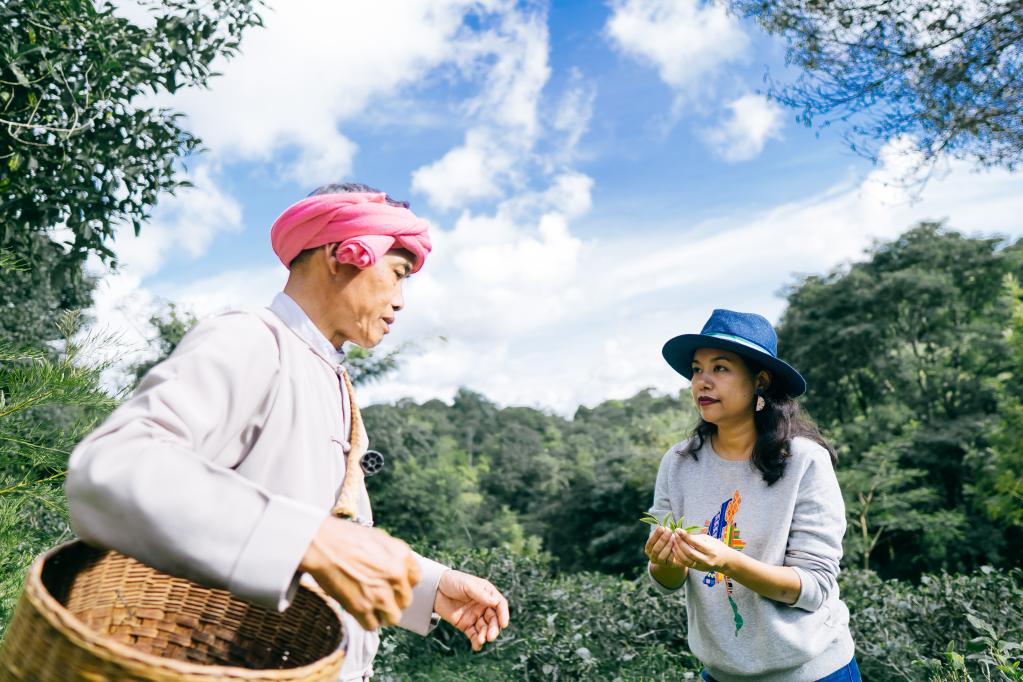
Story
11 March 2024
From Farmer and Food Vendor to Entrepreneur: Ma Mu Mu Htay's Inspirational Journey
In honoring the women of Myanmar, UNDP shines a spotlight on the inspiring journey of Ma Mu Mu Htay, a woman whose story encompasses entrepreneurship and empowerment. Transitioning from her roots as a farmer and noodle vendor to a prosperous natural fertilizer producer in Nyaung U township, Ma Mu Mu Htay's story represents the human development outcomes UNDP hopes to bring to Myanmar's dry zone.Ma Mu Mu Htay's journey began in the challenging dry zone, where year-round income from limited crops was a constant struggle. Juggling roles of selling noodle salad, fried fish balls, and farming groundnuts and beans during the season, she looked for opportunities beyond traditional farming. The turning point came with UNDP's Agri-based MSME business start-up training. "I had never attended training before in my life, but I wanted to do something apart from growing groundnuts here," shared Ma Mu Mu Htay. Ma Mu Mu Hay and 40 women participated in an Agri-based Micro, Small, and Medium Enterprise (MSME) business start-up training organized by UNDP in Nyaung U townships. They received training on presenting their business plans, marketing strategies, business operation plans, and business management plans. Teaming up with her neighbor, the duo embarked on a month-long training adventure facilitated by UNDP. This training not only equipped them with essential skills but also sparked the idea of producing natural fertilizer.Before the training, Ma Mu Mu Htay often struggled to buy expensive imported chemical fertilizers. UNDP's intervention not only provided her with the knowledge to use natural fertilizer on her farm but also inspired her to sell the surplus in her community."The knowledge that I gained from the training was priceless," she said, emphasizing the importance of learning financial management and profit calculation.Among the training participants, the Shwe Bagan natural fertilizer production group, led by Ma Mu Mu Htay and her friends, stood out for crafting business plans using the knowledge imparted during the training. Ma Mu Mu Htay's dedication and commitment bore fruit when her business plan for natural fertilizer won an award, bringing a startup fund of 2,000,000 Myanmar kyats ($714). The first 1,000,000 Myanmar Kyats ($357) went into building a warehouse for fertilizer production, and the rest was invested in raw materials. This marked the beginning of her venture into the natural fertilizer business. Months later, Ma Mu Mu Htay shared the ongoing success of her venture. She generated a supplementary and consistent income for her family and successfully promoted natural fertilizer within her community at a competitive price, thereby aiding the community in reducing expenditures on farming fertilizers.The UNDP initiative extended beyond training, technical support, financial assistance, and business connections. It also facilitated the process of obtaining business licenses and achieving market-grade certification for their product. A notable success emerged as these women received market-grade natural fertilizer certificates, enhancing the credibility of their products. Now, Ma Mu Mu Htay and her business partners are selling their natural fertilizer (Bokashi) at only 15,000 Myanmar kyats ($5) per bag, significantly below the market prices for chemical fertilizers, which cost between 30,000 to 50,000 Myanmar kyats ($11 to $18) per bag. The story of Ma Mu Mu Htay exemplifies the transformative impact of UNDP's support on women entrepreneurs in Myanmar's dry zone. Beyond fostering economic independence, the program has instilled a spirit of entrepreneurship, creating a ripple effect of positive change within communities. UNDP Myanmar has been actively empowering women from rural areas of the dry zone through agri-based MSME and value addition training, coupled with mentoring and startup grants to run their businesses. This comprehensive approach has resulted in 47 women entrepreneurs receiving startup grants to initiate their agri-based MSME businesses. As these women continue to break barriers and succeed, their journey becomes an inspiration for others, underscoring the significance of investing in women to accelerate progress.
1 of 5
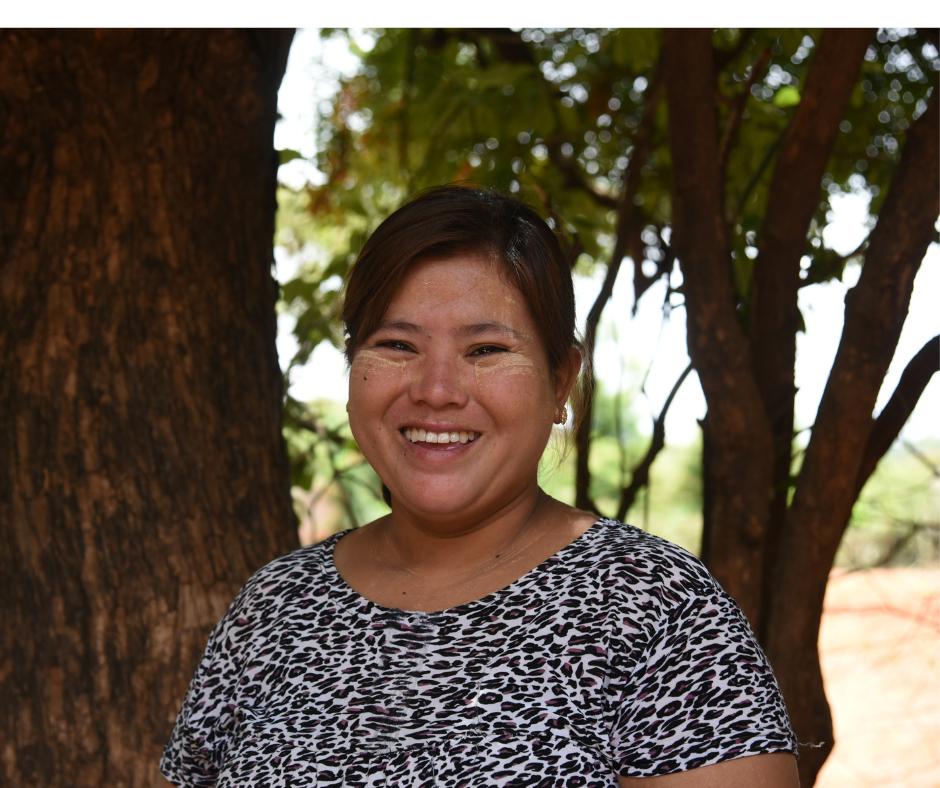
Press Release
19 April 2024
Myanmar: Türk sounds alarm amid rising tensions in Rakhine
Since the year-long informal ceasefire between the two sides broke down last November, 15 of Rakhine’s 17 townships have been affected by fighting, resulting in hundreds of deaths and injuries, and taking the number of displaced to well over 300,000.“Rakhine State has once again become a battleground involving multiple actors, and civilians are paying a heavy price, with Rohingya at particular risk,” the High Commissioner said. “What is particularly disturbing is that whereas in 2017, the Rohingya were targeted by one group, they are now trapped between two armed factions who have a track record of killing them. We must not allow the Rohingya to be targeted again.”The military has been fast losing ground to the Arakan Army (AA) throughout northern and central Rakhine. This has led to intensified fighting in the townships of Buthidaung and Maungdaw, ahead of an expected battle for the Rakhine State capital, Sittwe. The two townships are home to large Rohingya populations, putting them at grave risk.“Facing defeat, the military has outrageously started to forcibly conscript, bribe and coerce Rohingya into joining their ranks. It is unconscionable that they should be targeted in this way, given the appalling events of six years ago, and the ongoing extreme discrimination against the Rohingya including the denial of citizenship,” Türk said.Some reports say the military is forcing the Rohingya recruits or villagers to burn ethnic Rakhine homes, buildings or villages. Ethnic Rakhine villagers have allegedly responded in kind by burning Rohingya villages. The UN Human Rights Office is trying to verify all reports received, a task complicated by a communications blackout throughout the State.Türk said disinformation and propaganda are also rife, pointing to claims that “Islamic terrorists” have taken Hindus and Buddhists hostage. “This was the same kind of hateful narrative that fuelled communal violence in 2012 and the horrendous attacks against the Rohingya in 2017,” he said.Since the start of the year, the AA has positioned itself in and around Rohingya villages effectively inviting military attacks on Rohingya civilians.On 15 April, the Médecins Sans Frontières office and pharmacy were torched in Buthidaung, along with some 200 homes. Hundreds have fled and are reported to be taking refuge in a high school, the grounds of the former hospital, and along roads in Buthidaung town. With both the Maungdaw and Buthidaung hospitals having been shut by the military in March and with the conflict intensifying, there is effectively no medical treatment in northern Rakhine.“The alarm bells are ringing, and we must not allow there to be a repeat of the past,” Türk said. “Countries with influence on the Myanmar military and armed groups involved must act now to protect all civilians in Rakhine State and prevent another episode of horrendous persecution of the Rohingya.”
1 of 5
Press Release
08 April 2024
Secretary-General appoints Ms. Julie Bishop of Australia as Special Envoy on Myanmar
Ms. Bishop brings extensive political, legal, management and senior leadership experience to the role. She has held several high-level positions in the Australian Government, serving as Minister for Foreign Affairs (2013-2018), Cabinet Minister for Education, Science and Training, Minister Assisting the Prime Minister for Women’s Issues and Minister for Ageing. She was a member of the Australian Parliament (1998-2019), following a 20-year legal career.Throughout her career, Ms. Bishop has strengthened engagement with regional partners and led international negotiation efforts, including the first ever United Nations Convention on the Law of the Sea conciliation.Ms. Bishop is currently the Chancellor of the Australian National University. She holds a Bachelor of Laws from the University of Adelaide, Australia.
1 of 5
Press Release
19 March 2024
Statement attributable to the Spokesperson for the Secretary-General - on Myanmar
The Secretary-General remains deeply concerned by the deteriorating situation and escalation of conflict in Myanmar. He condemns all forms of violence and reiterates his call for the protection of civilians including aid workers in accordance with international humanitarian law, for the cessation of hostilities, and humanitarian access.
The expansion of conflict in Rakhine State is driving displacement and exacerbating pre-existing vulnerabilities and discrimination. The Secretary-General calls on all parties to prevent further incitement of communal tensions. He is alarmed by reports of ongoing airstrikes by the military, including today in Minbya township that reportedly killed and injured many civilians. He is concerned by reports of forcible detention and recruitment of youths, including Rohingya, and the potential impact of forced conscription on human rights and on the social fabric of communities in Myanmar.
The Secretary-General calls for sustained international and regional attention to the crisis in Myanmar, including through strengthening regional refugee protection efforts and responsibility sharing with countries hosting those fleeing persecution and violence. Addressing the root causes of systemic discrimination in Myanmar and seeking accountability for serious violations of international law will be central to any lasting solution to the crisis.
The United Nations is committed to staying and delivering in Myanmar and to working with all stakeholders, including ASEAN and other regional actors, to attain sustainable peace.
The expansion of conflict in Rakhine State is driving displacement and exacerbating pre-existing vulnerabilities and discrimination. The Secretary-General calls on all parties to prevent further incitement of communal tensions. He is alarmed by reports of ongoing airstrikes by the military, including today in Minbya township that reportedly killed and injured many civilians. He is concerned by reports of forcible detention and recruitment of youths, including Rohingya, and the potential impact of forced conscription on human rights and on the social fabric of communities in Myanmar.
The Secretary-General calls for sustained international and regional attention to the crisis in Myanmar, including through strengthening regional refugee protection efforts and responsibility sharing with countries hosting those fleeing persecution and violence. Addressing the root causes of systemic discrimination in Myanmar and seeking accountability for serious violations of international law will be central to any lasting solution to the crisis.
The United Nations is committed to staying and delivering in Myanmar and to working with all stakeholders, including ASEAN and other regional actors, to attain sustainable peace.
1 of 5
Press Release
14 March 2024
Carl Skau: People of Myanmar need more from the international community as situation deteriorates
During my visit, I have been profoundly impressed by the resilience of the people of Myanmar. Now is the time for the international community to come together to better support them. While in the country, my plea was clear and urgent: humanitarian assistance must reach all people who need it - wherever they may be.I also met with non-government and community-based organizations working at the frontlines to assist people. These organizations are resilient and capable but need humanitarian access and international support to continue to deliver in hard-to-reach areas. WFP is staying and delivering in Myanmar, reaching over two million people. Our national staff are living in this crisis and responding to it at the same time. They, and WFP’s partners, need stronger international leadership that supports expanded assistance and advocacy for the people. As I leave Myanmar, WFP’s commitment to the people and to our staff and partners in the field remains firm. We will continue to push for unimpeded humanitarian access, to draw attention to the significant and growing needs, and to lobby for more resources and stronger international and UN engagement for the people of Myanmar. Note to the editor:From 11-13 March, WFP’s Deputy Executive Director Carl Skau and Regional Director for Asia and the Pacific John Aylieff visited Myanmar to meet with WFP staff, partners, and stakeholders on how best to assist people in the face of growing conflict and food insecurity. # # #The United Nations World Food Programme is the world’s largest humanitarian organization saving lives in emergencies and using food assistance to build a pathway to peace, stability and prosperity for people recovering from conflict, disasters and the impact of climate change.
1 of 5
Press Release
07 March 2024
It’s time to invest in women and girls for a safer, more gender-equal Myanmar.
On this day, the United Nations (UN) in Myanmar honors and stands in solidarity with women and girls across Myanmar as they continue to demonstrate their leadership and participate in the destiny of their country. We also rally behind the 2024 UN theme for International Women’s Day – “Invest in women: Accelerate progress” – in calling for more investment to support Myanmar women and girls to live free from violence and have equal access to education and employment. Invest in women: Accelerate progress.The COVID-19 pandemic, military takeover, and extreme weather events such as Cyclone Mocha, have left Myanmar facing an ongoing political, economic, humanitarian, and human rights crisis. The poverty rate has doubled since 2021, almost 13 million people are food insecure, and 2.6 million people are internally displaced.[1] Women, girls, people with disabilities and internally displaced people are among those most marginalized. They bear the greatest burden of poverty and insecurity because crisis perpetuates gender disparities and increases women’s and girl’s vulnerability to trafficking, gender-based violence (GBV) and forced early marriage. Gender equality and women's rights are fundamental to Myanmar’s path within the Sustainable Development Agenda. Yet quite the opposite is taking place. We are witnessing a backslide on gender equality and a regression in women’s and girl’s rights, including their right to education, employment and to live a life without violence. International Women’s Day is a time to bring renewed attention to the challenges facing women and girls in Myanmar. It is also a time to recognize and champion their bold and brave leadership and resilience. Women and women-led businesses and organizations in Myanmar have a long history of taking a leading role in spurring economic development, providing aid and services, and advocating for the respect of human rights and gender equality. They have continued this work despite the high costs they have incurred, including individual women leaders and women’s organizations finding themselves under-resourced, facing excessive workloads and burnout, and enduring threats and violence on and offline. With a staggering 9.7 million women and girls in humanitarian need in Myanmar,[2] women’s civil society organizations are critical to the response. They serve populations in need in remote and often hard to reach areas, relying on their knowledge and networks to localize and deliver aid efficiently and effectively. Yet only 0.68 per cent of Official Development Assistance in Myanmar goes to women’s rights organizations.[3] They need the urgent support of the international community, including from UN agencies, to access adaptive, flexible investment. The UN will stay and deliver for women and girls in Myanmar.The UN and our resilient humanitarian partners – which includes a vast network of women-led organizations – reached at least 1.7 million women and girls with humanitarian assistance last year.[4] This included providing food assistance to 1.2 million women and girls and supporting more than 1 million women and girls with child protection, gender-based violence and mine protection services.[5] We also reached more than 570,000 women and girls with humanitarian Water, Sanitation and Hygiene (WASH) assistance,[6] helping them to better manage their health and hygiene, including during menstruation, pregnancy or breastfeeding. This International Women’s Day, the UN in Myanmar reaffirms our commitment to stay and deliver in Myanmar, to ensure more women and girls have a greater chance of finishing school, earning decent and sustainable livelihoods, exercising their right to choose if, and when, to have children, and living empowered lives free from violence. We echo the UN Secretary General’s words today highlighting that, “Women’s rights are a proven path to fair, peaceful, prosperous societies,” and his call for investment in, “programmes to end violence against women, and to drive women’s inclusion and leadership in economies, digital technologies, peacebuilding and climate action.” Because investing in women and girls not only enhances their rights – it creates long-term social and economic benefits for whole communities.
[1]UN OCHA Myanmar Humanitarian Update No. 35, January 2024. Available online.[2] Myanmar Humanitarian Needs and Response Plan 2024, UN OCHA, December 2023. Available online.[3] OECD, 2021. Data available online. [4] 2023 Myanmar Humanitarian Response Plan Year-End Dashboard. Available online. [5] 2023 Myanmar Humanitarian Response Plan Year-End Dashboard. Available online.[6] 2023 Myanmar Humanitarian Response Plan Year-End Dashboard. Available online.
[1]UN OCHA Myanmar Humanitarian Update No. 35, January 2024. Available online.[2] Myanmar Humanitarian Needs and Response Plan 2024, UN OCHA, December 2023. Available online.[3] OECD, 2021. Data available online. [4] 2023 Myanmar Humanitarian Response Plan Year-End Dashboard. Available online. [5] 2023 Myanmar Humanitarian Response Plan Year-End Dashboard. Available online.[6] 2023 Myanmar Humanitarian Response Plan Year-End Dashboard. Available online.
1 of 5
Latest Resources
1 / 11
Resources
21 February 2024
1 / 11

